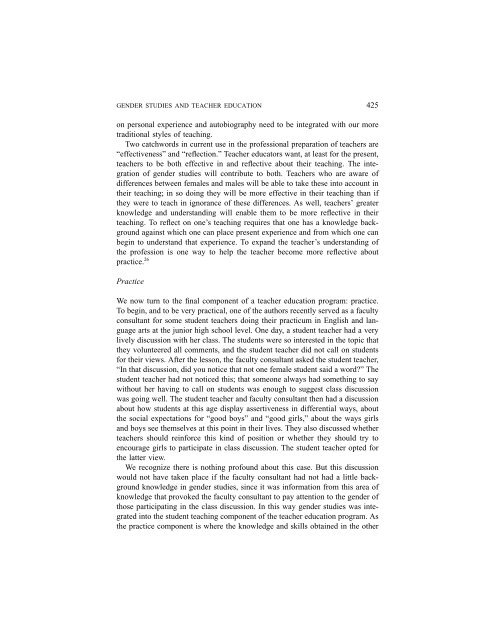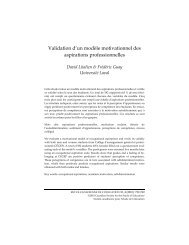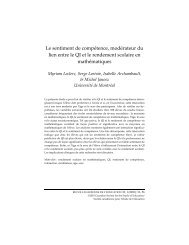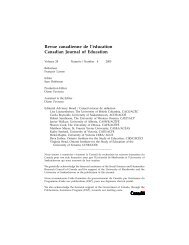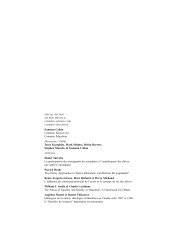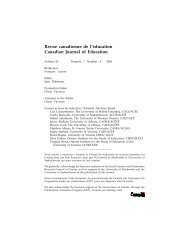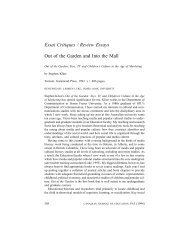Mireille Falardeau et Michel Loranger Le choix de stratégies ... - CSSE
Mireille Falardeau et Michel Loranger Le choix de stratégies ... - CSSE
Mireille Falardeau et Michel Loranger Le choix de stratégies ... - CSSE
Create successful ePaper yourself
Turn your PDF publications into a flip-book with our unique Google optimized e-Paper software.
GENDER STUDIES AND TEACHER EDUCATION 425<br />
on personal experience and autobiography need to be integrated with our more<br />
traditional styles of teaching.<br />
Two catchwords in current use in the professional preparation of teachers are<br />
“effectiveness” and “reflection.” Teacher educators want, at least for the present,<br />
teachers to be both effective in and reflective about their teaching. The integration<br />
of gen<strong>de</strong>r studies will contribute to both. Teachers who are aware of<br />
differences b<strong>et</strong>ween females and males will be able to take these into account in<br />
their teaching; in so doing they will be more effective in their teaching than if<br />
they were to teach in ignorance of these differences. As well, teachers’ greater<br />
knowledge and un<strong>de</strong>rstanding will enable them to be more reflective in their<br />
teaching. To reflect on one’s teaching requires that one has a knowledge background<br />
against which one can place present experience and from which one can<br />
begin to un<strong>de</strong>rstand that experience. To expand the teacher’s un<strong>de</strong>rstanding of<br />
the profession is one way to help the teacher become more reflective about<br />
practice. 26<br />
Practice<br />
We now turn to the final component of a teacher education program: practice.<br />
To begin, and to be very practical, one of the authors recently served as a faculty<br />
consultant for some stu<strong>de</strong>nt teachers doing their practicum in English and language<br />
arts at the junior high school level. One day, a stu<strong>de</strong>nt teacher had a very<br />
lively discussion with her class. The stu<strong>de</strong>nts were so interested in the topic that<br />
they volunteered all comments, and the stu<strong>de</strong>nt teacher did not call on stu<strong>de</strong>nts<br />
for their views. After the lesson, the faculty consultant asked the stu<strong>de</strong>nt teacher,<br />
“In that discussion, did you notice that not one female stu<strong>de</strong>nt said a word?” The<br />
stu<strong>de</strong>nt teacher had not noticed this; that someone always had som<strong>et</strong>hing to say<br />
without her having to call on stu<strong>de</strong>nts was enough to suggest class discussion<br />
was going well. The stu<strong>de</strong>nt teacher and faculty consultant then had a discussion<br />
about how stu<strong>de</strong>nts at this age display assertiveness in differential ways, about<br />
the social expectations for “good boys” and “good girls,” about the ways girls<br />
and boys see themselves at this point in their lives. They also discussed wh<strong>et</strong>her<br />
teachers should reinforce this kind of position or wh<strong>et</strong>her they should try to<br />
encourage girls to participate in class discussion. The stu<strong>de</strong>nt teacher opted for<br />
the latter view.<br />
We recognize there is nothing profound about this case. But this discussion<br />
would not have taken place if the faculty consultant had not had a little background<br />
knowledge in gen<strong>de</strong>r studies, since it was information from this area of<br />
knowledge that provoked the faculty consultant to pay attention to the gen<strong>de</strong>r of<br />
those participating in the class discussion. In this way gen<strong>de</strong>r studies was integrated<br />
into the stu<strong>de</strong>nt teaching component of the teacher education program. As<br />
the practice component is where the knowledge and skills obtained in the other


